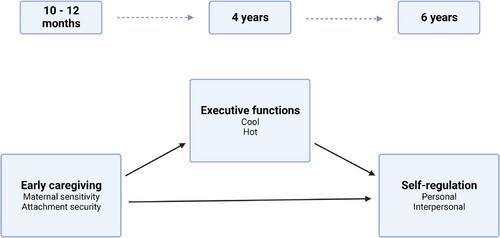A challenge to the expected: Lack of longitudinal associations between the early caregiving environment, executive functions in toddlerhood, and self-regulation at 6 years
Abstract
Previous research and theory indicate an importance of the quality of the early caregiving environment in the development of self-regulation. However, it is unclear how attachment security and maternal sensitivity, two related but distinct aspects of the early caregiving environment, may differentially predict self-regulation at school start and whether a distinction between hot and cool executive function is informative in characterizing such predictions through mediation. In a 5-year longitudinal study (n = 108), we examined these associations using measures of maternal sensitivity and attachment security at 10–12 months, executive function at 4 years, and self-regulation at 6 years. Surprisingly, and despite methodological rigor, we found few significant bivariate associations between the study variables. We found no credible evidence of a longitudinal association between maternal sensitivity or attachment security in infancy and self-regulation at 6 years, or between executive function at 4 years and self-regulation at 6 years. The lack of bivariate longitudinal associations precluded us from building mediation models as intended. We discuss our null findings in terms of their potential theoretical implications, as well as how measurement type, reliability, and validity, may play a key role in determining longitudinal associations between early caregiving factors and later self-regulation and related abilities.
Research Highlights
- The early caregiving environment has been implicated in the development of later self-regulation, which includes more basic skills, such as hot and cool executive functions (EF).
- In a 5-year longitudinal study, with a sample of 108 children, we rigorously measured aspects of early caregiving, EF, and self-regulation.
- We found no significant longitudinal associations between early caregiving and self-regulation at 6 years, nor between EF at 4 years and self-regulation at 6 years.
- These null results highlight the complexity of modeling self-regulation development and raise critical questions about general methodological conventions within self-regulation development research.


 求助内容:
求助内容: 应助结果提醒方式:
应助结果提醒方式:


